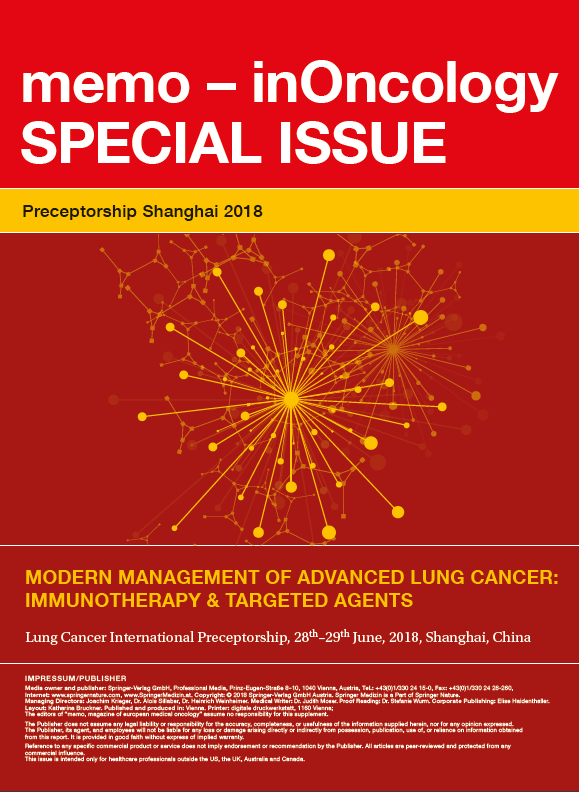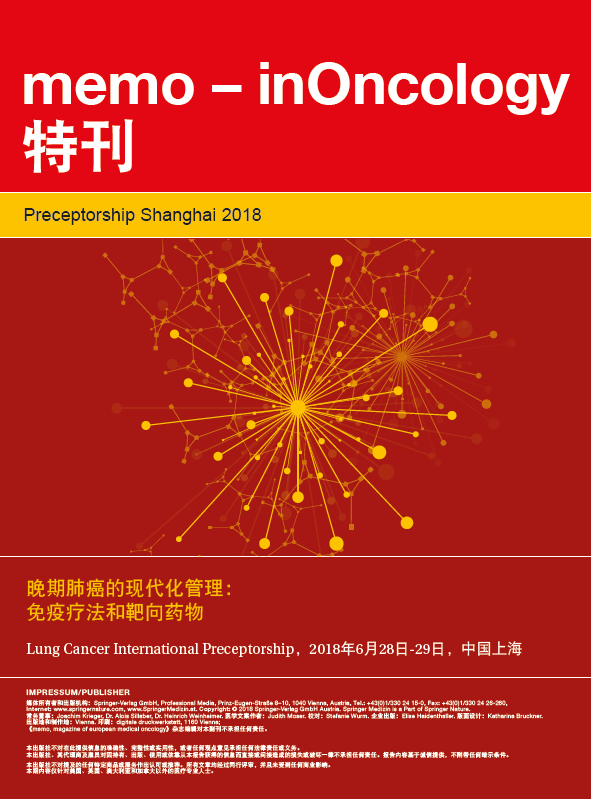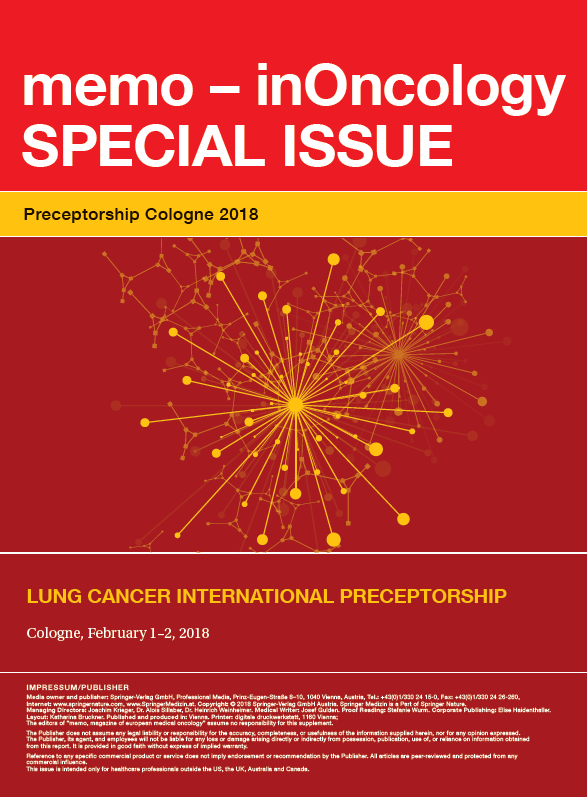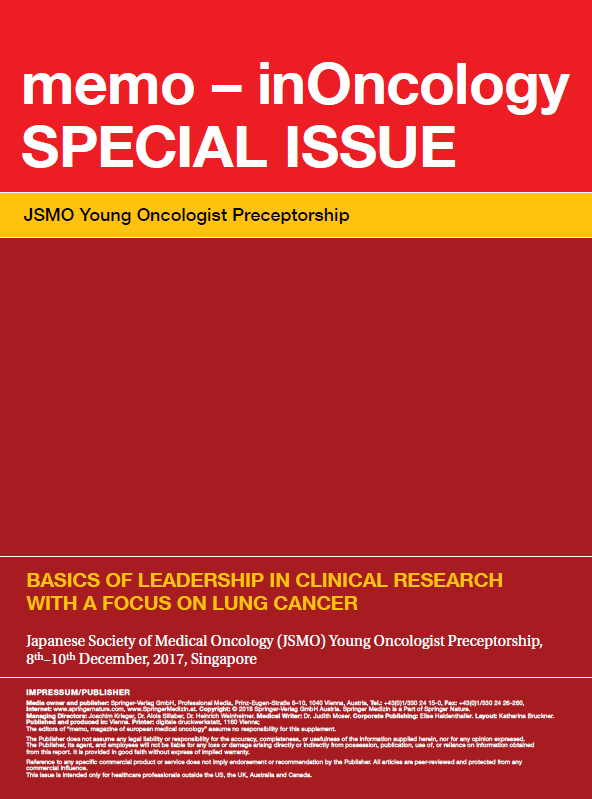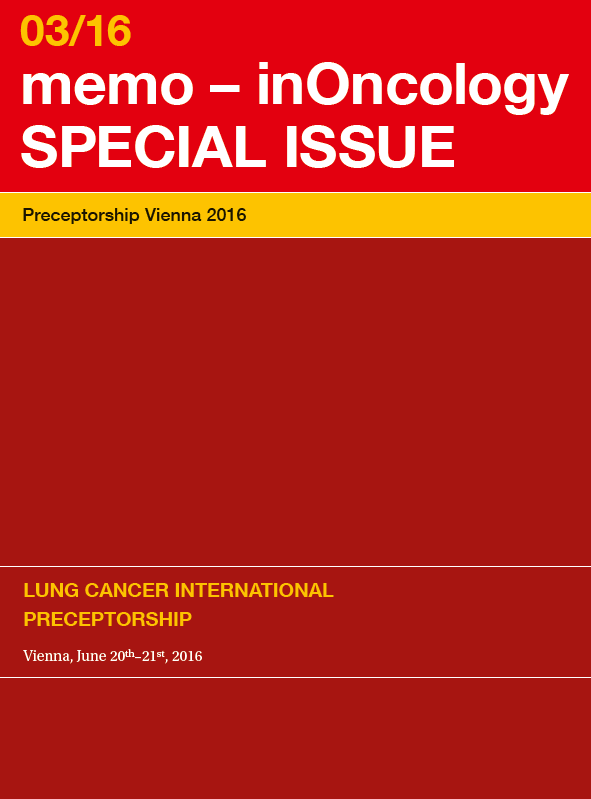Preceptorship reports
memo inOncology Education Preceptorship Reports summarise the latest in lung cancer research and treatments to come out of our Preceptorship meeting series. Sponsored with an unrestricted medical education grant, Springer Lung Cancer Preceptorship meetings bring lung cancer specialists from around the world to a centre of excellence, where lung cancer experts present the latest hot topics.
Preceptorship Shanghai 2018
Springer and the Shanghai Pulmonary Hospital held the Lung Cancer International Preceptorship on the 28th-29th June 2018, in Shanghai, China. The overall topic was the modern management of advanced lung cancer: Immunotherapy & Targeted Agents
Preface – Preceptorship Shanghai
Preceptorship Shanghai Caicun Zhou, MD, PhD, Shanghai Pulmonary Hospital, Director of the Cancer Institute of Tongji University, Shanghai, China Dear Colleagues, On 28th and 29th June, 2018, a Lung Cancer International Preceptorship directed towards medical oncologists took place in Shanghai, China. The scientific provider was the Shanghai Pulmonary Hospital affiliated to the local Tongji University.
Immunotherapy: the emerging paradigm of cure
Immunotherapy: the emerging paradigm of cure The introduction of molecularly targeted agents 15 to 20 years ago marked the beginning of a new era. Today, immune-checkpoint–inhibiting drugs have established yet another level of treatment.
EGFR- and ALK-targeted treatment: present and future
EGFR- and ALK-targeted treatment: present and future Chemotherapy for advanced or metastatic lung carcinoma has evolved slowly with limited progress between 1948 and the beginning of the 21st century. Until then, only minimal gains in long-term OS had been achieved, and the benefit of chemotherapy was discussed in a controversial manner.
序言
序言 周彩存,MD, PhD 上海市肺科医院 中国上海同济大学肿瘤研究所所长 亲爱的同事们, 2018年6月28日和29日,面向肿瘤内科医师的Lung Cancer International Preceptorship在中国上海召开。场地提供方为同济大学附属上海市肺科医院。在这两天的时间里,我们举办了讲座和研讨会,旨在提高与会者对中国以及国际肺癌管理的了解。参加指导会议的24名代表中,绝大多数在中国医院工作。会议主题范围涵盖了肺部恶性肿瘤的筛查、诊断和病理学以及各种类型的治疗。会议
免疫疗法:新兴的治疗范例
免疫疗法:新兴的治疗范例 15至20年前分子靶向药物的引入标志着一个新时代的开始。今天,免疫检查点抑制剂也已开启另一治疗模式。由于化疗和靶向药物直接作用在肿瘤上,这意味着耐药性最终会出现,而免疫疗法针对免疫系统,使一定比例的患者能够生存更长时间。在治疗开始后2年仍存活的晚期非小细胞肺癌(NSCLC)患者有些生存超过5年的。因此,晚期癌症治疗的新范例已经出现。 当前使用的三类免疫检查点抑制剂为:抗CTLA-4抗体(例如,易普利姆玛(ipilimumab),tremelimumab)、抗PD
EGFR和ALK靶向治疗:当下与将来
EGFR和ALK靶向治疗:当下与将来 用于晚期或转移性肺癌的化疗发展缓慢,在1948年至21世纪初期间进展有限。在此之前,仅有很少达到了长期OS获益,因此对于化疗的益处一直存在争议。幸运的是,分子靶向药物正在彼时兴起。过去二十年间取得了惊人的进展。如今,许多药物可用于治疗癌基因驱动的肺癌患者。 EGFR TKI治疗 起点:吉非替尼(gefitinib)和厄洛替尼(erlotinib) 靶向敏感EGFR突变的药物包括厄洛 替尼、吉非替尼、阿法替尼(afatinib)、达克替尼(dacomi
Preceptorship Cologne 2018
Springer and The University Hospital Cologne held the Lung Cancer International Preceptorship on the 1st–2nd February 2018, in Cologne Germany.
Preface – Preceptorship Cologne
Preface – Preceptorship Cologne Dear Colleagues, This report summarizes presentations that were given during the Lung Cancer International Preceptorship Conference that took place in Cologne, Germany, on February 1 and 2, 2018.
Challenges and State of the Art: The early stage patient
Challenges and State of the Art: The early stage patient Surgery: How aggressive should it be? Surgical treatment of patients with early lung cancer is often a challenging task that requires robust preoperative risk assessment as a first step.
Challenges and State of the Art: The intermediate stage patient
Challenges and State of the Art: The intermediate stage patient Staging: How to precisely determine mediastinal lymph node involvement A key determinant for which type of treatment can be offered to patients with NSCLC is their intrathoracic (mediastinal) nodal status.
Challenges and State of the Art: The advanced stage patient
Challenges and State of the Art: The advanced stage patient With 2-year OS of < 15 %, the prognosis of patients with advanced lung cancer has been invariably poor for decades, irrespective of the chemotherapy that was combined with platinum compounds, as Jürgen Wolf, MD, Department of Internal Medicine I, University Hospital of Cologne, remarked (e. g. [1]).
Focus Molecular Diagnostics
Focus Molecular Diagnostics Molecular diagnostics: which markers, which methods? All existing guidelines call for timely determination of molecular parameters relevant for approved targeted and immune treatments of unresectable NSCLC, as Reinhard Büttner, MD, Department of Pathology, University Hospital of Cologne, emphasized.
Preceptorship Singapore 2017
Springer and the Japanese Society of Medical Oncology (JSMO) held the Young Oncologist Preceptorship over the 8th–10th December 2017, in Singapore, bringing young oncologists under the guidance of a panel of renowned experts in the field of lung cancer in order to boost the participants’ research, refine their presentation skills, and discuss evidence-based standard care decisions for non–small-cell lung cancer (NSCLC) patients. The Preceptorship was entitled: “Basics of leadership in clinical research with a focus on lung cancer.” Read a memo inOncology report of the meeting here. For more information about this Preceptorship please visit the JSMO website! (click here for Japanese version)
Preface – Preceptorship Singapore
Preface – Preceptorship Singapore Kenji Tamura, MD, PhD National Cancer Center Hospital, Department of Breast and Medical Oncology, Tokyo, Japan Co-Chair of the JSMO Young Oncologist Preceptorship
How to approach translational research as a clinician
How to approach translational research as a clinician A career as a physician scientist can be extremely fulfilling, as it is an opportunity to make a difference in patient care by way of academic excellence. Clinical observations are explored in the translational setting based on experience and prior knowledge; eventually, the insights gained in this way can give rise to clinical innovation.
Statistical considerations in randomized controlled trials
Statistical considerations in randomized controlled trials Basic statistical concepts In the setting of a clinical study, sample data are used to make an inference for the entire population. Generally speaking, results from a randomized clinical trial (RCT) will be unlikely to be exactly the same as population parameters, which is the reason for bias involved.
Combination of molecularly targeted drugs in lung cancer
Combination of molecularly targeted drugs in lung cancer Most of the targeted agents currently recommended for the treatment of lung cancer are administered as single agents. However, there is a rationale for combinations, as two drugs might act in an additive or synergistic manner and may control different populations of tumor cells.
Precision medicine in the field of lung cancer in Japan
Precision medicine in the field of lung cancer in Japan In 2013, Japanese researchers launched a nationwide, prospective, observational study for patients with lung cancer and genomic alterations, called Lung Cancer Genomic Screening Project for Individualized Medicine in Japan (LC-SCRUM-Japan).
Behind the magic of giving academic lectures
Behind the magic of giving academic lectures According to a Wikipedia definition, a presentation is the act of giving something to someone in a formal way. This should not just be a narration of information or data; ideally, a presentation should contain a story, which means that a plot, characters and a narrative point of view need to be included.
Preceptorship Vienna 2016
Springer had their inaugural Lung Cancer International Preceptorship at the
highly regarded MedUni Vienna in June 2016, with Professors Robert Pirker and Sabine Zöchbauer-Müller. Read a memo inOncology report of the meeting here.
Pathology and WHO classification of tumours of the lung: what is new?
Pathology and WHO classification of tumours of the lung: what is new? The WHO classification of tumours of the lung, pleura, thymus and heart that was published in 2004 [1] was revised in 2015 [2] (Figure 1). Leonhard Müllauer, MD, Institute of Pathology, Medical University of Vienna, Austria, summarised the changes.
Screening and early detection of lung cancer
Screening and early detection of lung cancer According to the principles stated by the World Health Organisation, screening programmes are aimed at timely detection of diseases that represent important health problems and for which there are accepted treatments [1].
Staging of lung cancer: the 8th TNM classification
Staging of lung cancer: the 8th TNM classification In 2009, the 7th Edition of the TNM classification of malignant tumours was published [1]. The proposals for the revised T, N and M categories will be implemented in the 8th Edition that is expected for late 2016.
Treatment of lung cancer: status quo & news from ASCO 2016
Treatment of lung cancer: status quo & news from ASCO 2016 Robert Pirker, MD, Department of Internal Medicine I, Medical University of Vienna, Austria, discussed evidence from clinical trials for the treatment of lung cancer, with a focus on the findings presented at the ASCO 2016 Congress.
Disease monitoring using circulating cell-free tumour DNA
Disease monitoring using circulating cell-free tumour DNA In Caucasian patients, mutations of the EGFR gene occur in 10 % to 15 % of adenocarcinomas of the lung. “These tumours depend on EGFR signalling for growth and survival,” explained Anna Buder, MSc, Institute of Cancer Research, Department of Medicine I, Comprehensive Cancer Center, Medical University of Vienna, Vienna, Austria.
Videos
Impressions from participants – Preceptorship 2016 Vienna
Participants of the inaugural Springer International Lung Cancer Preceptorship 2016 give their impressions of the meeting.


